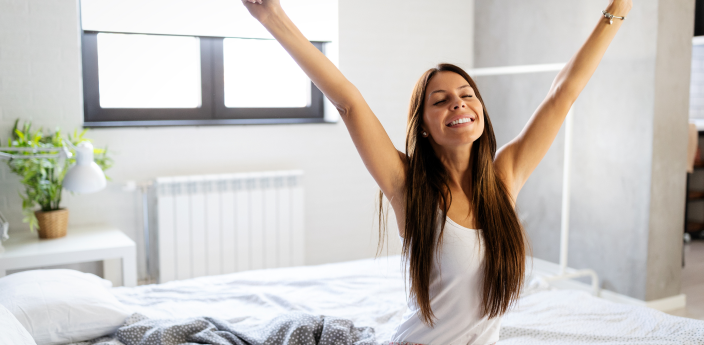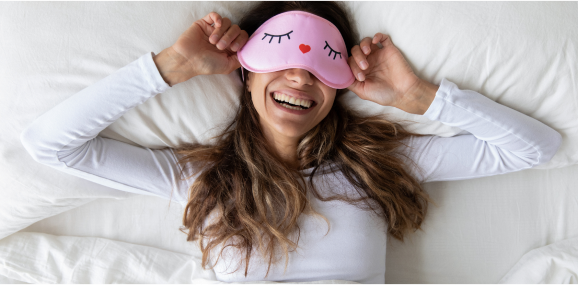Unless you’re not getting enough sleep, you probably don’t find yourself talking about sleeping very often. Sleep is a necessary part of every human’s life, but unless you get poor sleep, it’s not usually the hot topic of your daily conversations.
Inadequate sleep, sometimes referred to as insomnia, affects between 50-70 million Americans each year, and the problem is only getting worse. Whether it’s a problem with your sleep hygiene (the environment you create to promote sleep) or something else, not getting proper sleep has detrimental effects on your health.
In addition to exhaustion, irritability, and feeling run down, not sleeping also takes a toll on your mental health and can begin to feel like the stuff of nightmares.
The team at Hug Sleep understands. Let’s talk about why we need sleep, how it affects mental health, and what you can do to get a better night’s sleep.
Why Do We Need Sleep?
It’s more than just feeling well-rested — sleep is when your body restores and repairs. During your sleep hours, cells regenerate, our immune system recharges, and muscles and tissues repair. You need sleep in order for these functions to happen correctly.
Mentally, your brain packs away new information (kind of like cleaning up files) and discards information that is no longer needed. Nerve cells in your brain fire up, communicate, and prepare for the next day’s healthy brain function.
Suffice it to say, sleep isn’t an option. Without it, both our bodies and our brains suffer.
How Much Sleep Do We Need?
Most adults need between 7-9 hours of sleep in a 24 hour period. Unless you work shift work, you’ll likely get that at night. Depending on your personal activity level, you may need more or less sleep.
Babies and teenagers sleep a lot because their bodies are undergoing massive periods of growth and development. As we get older, we need less sleep because our bodies are no longer growing.
Can You Get Too Much Sleep?
Sleep is tricky, because there’s a sweet spot for everyone (aka: the perfect amount of hours you need to sleep each night). Getting too much sleep is also harmful to your health. Too much sleep can lead to health problems like obesity, heart disease, depression, and even chronic headaches.
How much is too much? It’s different for each person, but it’s usually defined as sleeping more than 8-9 hours per day and still waking up feeling tired.
What Happens When We Don’t Get Enough Sleep?
When you don’t get enough sleep, you’ll feel tired. Miss more than a few nights of sleep, and you’ll begin experiencing daytime sleepiness.
Mental health arguably suffers most when we don’t sleep enough.
The connection between good mental health and sleep is a two-part problem:
- Lack of sleep can worsen feelings of anxiety, sadness, and increase feelings of hyperactivity and irritability.
- People who suffer from mental illness are more likely to suffer from sleep disorders.
Research shows that 50 to 80% of psychiatric patients suffer from sleep deprivation compared to less than 20% of the general population that doesn’t suffer from poor mental health. Because poor sleep quality and mental health have a sort of symbiotic relationship, it’s important to make sure mental health patients have all the tools they need to sleep better.
Likewise, it’s important everyone gets enough sleep to help support healthy cognitive function. Let’s take a closer look at how sleep and mental health are interconnected.
Why Sleep Affects Mental Health
The study of how sleep affects mental health isn’t new. Researchers have known for years that the amount of sleep we don’t get directly impacts our mental function and cognitive abilities.
The theory most widely accepted is this: Someone who has an existing mental illness will be at higher risk of developing sleep related issues.
However, new research shows the opposite is true: poor sleep can lead to increased mental distress. If you miss sleep and feel overwhelmed, disoriented, disorganized, or sad, you probably have your poor sleep to blame.
What Are the Risk Factors?
Your risk of not sleeping increases if you are in certain groups. For instance, if you are an employee who works shift work, like medical staff, or if you are a college student who frequently pulls all-nighters to cram for exams.
Underlying health issues like diabetes, heart disease, and high blood pressure can also contribute to sleeplessness.
If you already experience mental health problems, your risk of developing sleep disorders increases. Additionally, you may find that you develop more noticeable side effects and that your symptoms worsen when you sleep less than you need.
Understanding How Sleep Works
Before we dissect how to get a better night of rest it’s important to understand how sleep works. In other words, what tells our brains and bodies it’s time for bed. There are two functions that work together to promote healthy sleep habits: the circadian rhythm and the sleep drive.
Circadian Rhythm
Your circadian rhythm is a biological process that operates on a 24-hour basis. It’s not just responsible for regulating your body’s sleep patterns, it also governs when you should be awake. Your circadian rhythm responds to light cues to help you wake up in the morning and begin producing melatonin tp help you sleep night.
Circadian rhythm also controls your body temperature, digestion, and determines when you’ll be most awake and alert.
Sleep Drive
Circadian rhythm may react to decreased light in the evenings and trigger your body to produce melatonin, but your sleep drive is what effectively sends you to sleep. Your sleep drive builds throughout the day. Think of it like a glass that is empty when you wake up in the morning. You just had a good night of rest, so you don’t require any sleep.
As you expend energy throughout your day and spend hours awake and alert, your sleep drive (or need for sleep) builds just as if you were filling the glass with water. When your sleep drive is full, you’ll become tired and want to sleep.
Sleep drive decreases over the span of your lifetime, as the amount of sleep you need also decreases.
Both your circadian rhythm and your sleep drive need to operate properly in order for you to get good, consistent sleep.
Top Causes of Poor Sleep
We know that drinking caffeine just before bed is probably not a failsafe way to get a good rest. There are, however, some other sleep-robbing variables that might be causing you to miss out on your Zzz’s.
- Stress. Whether or not your team makes it to the playoffs might not keep you up at night (unless there’s money on the line) but a big decision at work, relationship woes, or financial problems can all keep you up at night.
- Crossing time zones. Your circadian rhythm needs a few days to catch up with a new time zone. If you travel across time zones frequently for business, you could find it hard to get sleep when you need it.
- Bad sleep hygiene. Eating too close to bedtime, watching TV or using a tablet or smartphone, taking frequent naps, and not going to bed at a consistent time are all hallmarks of poor sleep hygiene that can cause you to lose sleep.
- Caffeine and alcohol. Caffeine has a half life of about 3-5 hours. That means 3-5 hours after you consume it, it’s still firing up your bloodstream and keeping you awake. Alcohol is a depressant which may make you fall asleep, but it interrupts your sleep cycles, making it harder for you to get much-needed deep sleep and REM sleep.
- Certain medications and/or supplements. If you recently developed sleep issues after you began taking a new medication or even an OTC supplement, that could be the culprit. Check with your doctor to see if sleeplessness is a known side effect.
Once you’ve eliminated obvious reasons why you might not be sleeping, you can focus on proactive ways to get better sleep.
How To Get Better Sleep
It’s not rocket science, but getting a good night of sleep can feel that way when sleep evades you. Here are five tips to getting better sleep, including a technique called deep touch pressure therapy.
1. Create a Routine
As adults, we don’t have someone telling us it’s time to go to bed. Going to sleep at the same time every night creates good sleep hygiene and helps regulate both your circadian rhythm and your sleep drive.
2. Power Off
It might seem like catching up on social media or watching tv is the perfect way to relax yourself to sleep, but the light emitted from your screens (known as “blue light”) can interfere with your circadian rhythm and trick your body into thinking it isn’t time to go to sleep.
Additionally, the information you read and see has the ability to stimulate your mind, which can keep you up longer.
3. Avoid Caffeine
We get it; you probably aren’t going to cut caffeine completely out of your life. If you’re struggling to sleep, limit yourself to one caffeinated beverage per day, and drink it as early in the day as possible. Remember that caffeine has a half-life. If you drink a cup of coffee at 5:00 p.m., it could still remain in your bloodstream by 10:00 p.m.
4. Limit Alcohol
It’s easy to turn to a glass of wine to relax you if you have trouble sleeping, but this isn’t a viable solution to sleeplessness. In fact, alcohol inhibits deep sleep, making it harder for you to get the quality rest you need.
5. Try Deep Touch Pressure Therapy
Deep touch pressure therapy, also known as deep touch pressure stimulation, is a cognitive behavioral therapy technique that calms the nervous system through sensory processing (we’ll explain what this means in just a moment). Used correctly, it has the ability to calm your nerves, ease feelings of high stress, and promote an environment perfect for sleeping.
Deep Touch Pressure Therapy and Sleep
When you can’t sleep, your body is likely running in “fight of flight” mode. This means your sympathetic nervous system (“SNS”) is at the wheel. The SNS is important, and helps you respond quickly to stressful situations. However, it can also cause you to become irritable, stressed, and even angry.
Before sleep can happen, your body needs to switch to its parasympathetic nervous system (“PSNS”). The PSNS helps your body “rest and digest.” If your body is stuck in SNS mode, you’ll find it difficult to sleep.
Deep touch pressure therapy seeks to help switch your body from SNS to PSNS mode easily and effectively.
Is DTPT Legit?
If you’ve been struggling with sleep for a long time, it’s normal to have questions about whether something will work for you. Thankfully, deep touch pressure therapy is research and science-backed. What’s even more reassuring is that studies show that deep touch pressure therapy (DTPT) is useful in helping people with declining mental health achieve rest.
Because we know that sleep and mental health are not mutually exclusive, we can expect mood support as a natural result when DTPT is used to help support the quality of an individual’s sleep.
How Does DTPT Work?
It works… like a hug. The warmth of an embrace releases hormones that help relax your body and brighten your mood. Deep touch pressure therapy works similarly, by applying pressure to the body at certain points (or all over like a hug) to help move your body from SNS to PSNS.
One of the easiest ways to engage in DTPT on your own is by using the Hug Sleep Sleep Pod.
Hug Sleep: The Adult Swaddle You Need Right Now
There’s a reason why we swaddle babies when they’re born. DTPT helps emulate the sensation they experienced in the womb, keeping them calm. As we get older, our nervous systems still respond to that same kind of stimulation. That’s why the Hug Sleep Sleep Pod is so effective at helping you relax.
Hug Sleep developed a way to help you get the deep touch pressure therapy you need easily. Our uniquely designed, wearable sleep blanket applies gentle pressure all over your body, helping calm your nervous system and lull you into a peaceful, sleep-ready state.
The Sleep Pod Move allows for maximum mobility, so you always feel comfortable, never restricted. The perfect amount of pressure and temperature regulation make it easy for you to practice better sleep hygiene.
Combine the Sleep Pod with other relaxation techniques, like dim lights, essential oils, and a cool room and you’re on your way to experiencing better sleep and more mental clarity.
Put Your Sleep Problems to Bed
Your mental health suffers when you don’t sleep, so ensuring you’re set up for a great night of rest is important. Lifestyle changes can help you prepare for sleep and regulate your circadian rhythm and sleep drive, but to help switch your body from “go” to “slow,” deep touch pressure stimulation is the research-backed method to try.
Hug Sleep makes it easy for you to get deep-touch pressure therapy every single night and get to catching the zzzs your mental health is asking for.
Sources:
The State of SleepHealth in America|Sleep Health.org
Why Do We Need Sleep?|Sleep Foundation.org
Oversleeping: Bad for Your Health? | Johns Hopkins Medicine
Sleep and Mental Health - Harvard Health Publishing
Effect of Inadequate Sleep on Frequent Mental Distress|CDC.gov
What is Deep Pressure Stimulation?|Applied Behavior Analysis Edu.org

































500,000+ happy customers